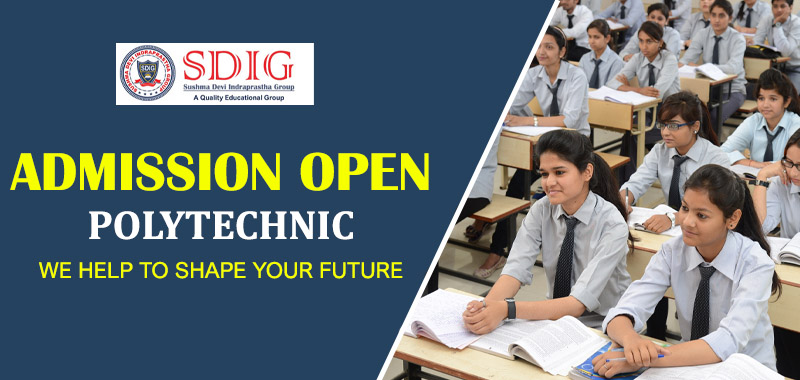.jpg)
.jpg)

Polytechnic is a diploma or vocational course in which an institute focuses on delivering technical education. Generally, polytechnic courses are a three year programme after completion of which candidates obtain a certificate. Polytechnic also helps students to start their career by getting a good job at a reputed company. Most of the institutes offers polytechnic diploma in civil, mechanical, electrical, and newly emerging branches.
Civil engineers design, build, and maintain the foundation for our modern society – our buildings, roads and bridges, drinking water and energy systems, sea ports and airports, and the infrastructure for a cleaner environment, to name just a few.
Mechanical engineers work to design, develop, build, and test all sorts of mechanical devices, tools, engines and machines. The work of mechanical engineers can take items right through the product lifecycle, from initial design and development through to installation, testing and maintenance.
Electrical engineering is an engineering discipline concerned with the study, design, and application of equipment, devices, and systems which use electricity, electronics, and electromagnetism. Electrical engineering is now divided into a wide range of different fields, including computer engineering, systems engineering, power engineering, telecommunications, radio-frequency engineering, signal processing, instrumentation, photovoltaic cells, electronics, and optics and photonics.
Automobile Engineering is the branch of engineering which deals with designing, manufacturing, mechanical mechanisms as well operations of automobiles. It is also an introduction to vehicle engineering which includes cars, motorcycles, trucks and buses etc. It is an advanced branch of engineering which deals with the investigation of repairs and their reconstruction. Professionals called as Automobile Engineers are responsible for designing heavy-duty vehicles such as trucks, vans and pick-up carriages for long-distance transportation. This course is offered in undergraduate and postgraduate levels and across various specialisations such as Chassis, Aerodynamics, Electronic Vehicles, Motorsport etc
Computer Science Engineering is a course that deals with the design, implementation, and management of information systems of both software and hardware processes. A computer scientist specialises in the theory of computation and the design of computational systems.
Machine learning is a branch of artificial intelligence (AI) and computer science which focuses on the use of data and algorithms to imitate the way that humans learn, gradually improving its accuracy.
Electronics and Communications Engineering (ECE) involves researching, designing, developing, and testing electronic equipment used in various systems. Electronics and Communications engineers also conceptualise and oversee the manufacturing of communications and broadcast systems. This stream of engineering deals with analogue transmission, basic electronics, microprocessors, solid-state devices, digital and analogue communication, analogue integrated circuits, microwave engineering, satellite communication, antennae, and wave progression. It also deals with the manufacturing of electronic devices, circuits, and communications equipment. In India, Electronics and Communications Engineering is offered by various colleges at the UG as well as PG level leading to BTech (4 years) and MTech (2 years) degrees respectively.
The Aircraft Maintenance Engineering (AME) course is an internationally license course involved in the modification, repair, maintenance, testing, and solving of the difficulties faced in aircraft. Consent from a licensed Aircraft Maintenance Engineer is compulsory process before to take the aircraft off the ground. It is reliability of an AME to ensure the fit-to-fly condition of aircraft. The incredible growth in air passengers can be considered a proof of the development of aviation. It is the perfect period for candidates who are eager to make careers in the aviation industry. In this course, the institutes offered in India have mostly been approved by the Directorate-General of Civil Aviation (DGCA), the government of India.
| ADMISSION PROCEDURE | ||
|---|---|---|
| ELIGIBLITY FOR Polytechnic | 10th/12th/ITI | |
| Duration For Polytechnic | 3 years/2 YEARS (LE) | |
| Offered Courses | MLT, DMLT, BMLT/ DOT, DOT, BOT, DRIT, BRIT, DPT, BPT, DNYS, BNYS, D'OPTOMETRY, CMS-ED | |
Copyright 2023.Sushma Devi Indraprastha Group. All Rights Reserved
Design By: SBBJ IT SOLUTIONS